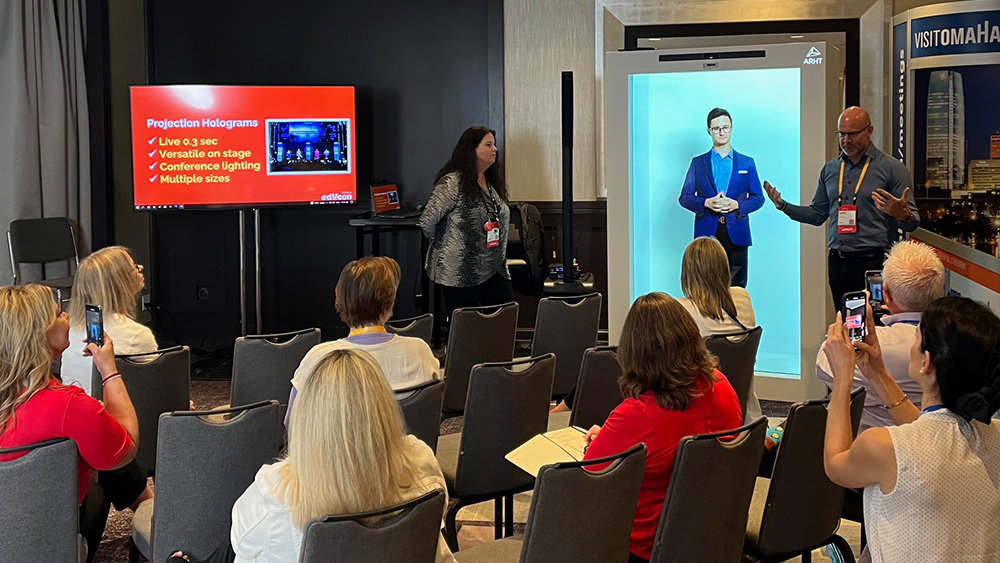
Hologram technology was one of six tech solutions explored during the Tech Labs at PCMA EduCon 2023 in Montreal. (Photo courtesy of Shawn Cheng)
At previous PCMA Convening Leaders and EduCon events, event technology was showcased in an open activation hall, where companies demoed their products, services, and platforms to attendees. That format was reimagined at this year’s PCMA EduCon, held June 25-28 in Montreal, with scheduled Tech Lab sessions that explored — and seamlessly integrated — a technology in an educational and interactive experience. Anh Nguyen, founder of Spark Event Management, and Shawn Cheng, event strategist at Curious Bear Management, who designed and led the sessions, sought to make the Tech Labs less of a presentation about technology and more of an opportunity to offer substantial content and meaningful learning experiences. Both Nguyen and Cheng, recognized for their #EventProfsBreakShit initiative, recently debriefed with Convene on how the Tech Lab sessions went over.
According to Nguyen, our industry is characterized by its “high-touch, high-service” approach, setting it apart from the way other industries use SaaS (software as a service). The Tech Labs format benefited both planners and tech providers: While the planners were testing a company’s technology’s capabilities, the company had the opportunity to observe how their end audience interacted with it. Cheng added that these observations would pay off once planners and tech providers talk business in the future — “the tech company will be able to know better on what to pitch,” he said, “rather than go through that full demo” and turn off planners.
While technology adoption has historically been swifter in other sectors when compared to the events industry, Nguyen pointed out that the business of events places a stronger emphasis on “experience design and the creative side.” In contrast, other fields often employ a pay-to-play model at trade shows, where tech features are showcased, prices are provided, and the decision rests with the buyer. “It is more transactional,” she said. “What makes it really hard to sell technology to event planners is that it is easy for us to switch suppliers.”
But there may be another underlying problem when it comes to planners shopping for tech solutions. It’s in event planners’ nature to be perfectionists and they therefore have the same high standards for the tech they adopt, Nguyen said, but “technology just isn’t built like that.” Solutions are launched before they are perfected and with stable performance. They may break or get broken by planners in the process — and this is okay, she said. Breaking things, Nguyen has found herself, is the best way to learn, instead of “waiting for someone to tell me that this is how we do it.”
To enhance the format’s effectiveness in the future, Nguyen and Cheng suggested that sessions should include an event planner who helps guide discussions. Another future improvement they identified was to have all the technology in an open space that would invite even more play and less of a session-style format — somewhat of a hybrid iteration of previous tech showcases at PCMA events. Despite occasionally feeling like the sessions turned into “event profs sharing their opinion,” both Nguyen and Cheng agreed that it is an improvement over “event profs get pitched at.” And a way for planners and tech providers to learn from each other.
Magdalina Atanassova is digital media editor of Convene.
